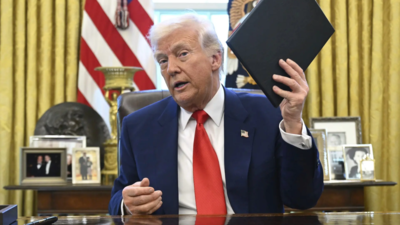‘They were getting yippy’: How bond market spooked Trump to hit pause button on reciprocal tariffs

After a week of economic chaos and criticism from allies, President Trump abruptly reversed course on his sweeping new tariffs, hitting pause for 90 days. What changed? Not just pressure from businesses or Republicans—Trump was rattled by a bond market in meltdown mode. The sudden surge in Treasury yields, signaling panic instead of the usual “safe haven” behavior, set off alarm bells in the White House.
Even treasury secretary Scott Bessent, one of Trump’s key economic voices, warned of the risks. Bond markets aren’t just abstract finance stuff—they fund government programs. When yields spike and buyers vanish, that’s not just Wall Street nerves; it’s a signal that something big could break.
Here is all you need to know
Q: What are tariffs, and why did Trump impose them?
A: Tariffs are taxes on imported goods, designed to make foreign products more expensive and encourage people to buy American. Trump pushed for “reciprocal tariffs” to match what other countries charge the US. He believed this would level the playing field and pressure countries into negotiating better trade deals—especially China, which he accused of unfair practices.
Q: Why did Trump pause the new tariffs after just one week?
A: The bond market freaked out—and that made the risks real. When investors started dumping US Treasury bonds, it drove up yields fast. This was a red flag for economists and officials, signaling that confidence in the US economy was shaking. A bond market panic can lead to higher borrowing costs, stock crashes, and even recession. As he put it: “They were getting a little bit yippy, a little afraid.” Trump, seeing this and fielding angry calls from business leaders and Republican allies, pulled back—at least temporarily.
Q: What’s the bond market, and why does it matter?
A: The bond market is where the US government borrows money by selling Treasury bonds. These are usually seen as ultra-safe investments. If investors stop buying them—or worse, start selling them—it’s a sign of deep concern. Without steady demand for these bonds, the government could face trouble funding everything from infrastructure to defense. That’s why a selloff in this market causes panic—it suggests serious instability, and potentially, a crisis.
Q: Did Trump really change his mind because of the markets?
A: Yes, and he admitted as much. “I was watching the bond market. The bond market right now is beautiful. But yeah, I saw last night where people were getting a little queasy,” he said. Behind the scenes, top officials like Scott Bessent were sounding the alarm. Calls flooded in from CEOs and GOP lawmakers warning the president of a looming economic disaster if the tariffs stayed in place. That pressure, plus the sharp market drop, forced his hand.
Q: What happened to the stock market after Trump’s announcement?
A: It surged. Wall Street celebrated the pause like a victory. The S&P 500 jumped 9.5%—an entire year’s worth of gains in one day. The Dow Jones rose nearly 3,000 points. That kind of rebound shows just how worried investors had been about the tariff plan, and how relieved they were when it was paused.
Q: Is the trade war over?
A: Not even close. While Trump hit pause on tariffs for most countries, he actually increased tariffs on Chinese imports, raising them to 125%. China responded by slapping 84% tariffs on US goods. So while other countries got a break, the US–China trade battle is still in full swing—and could get worse.
Q: Why does this matter to regular people?
A: Tariffs can raise prices on everyday items—phones, clothes, groceries. If businesses get hit with higher costs, they pass them on to consumers. On top of that, stock market crashes can hurt retirement savings, and higher bond yields can lead to pricier loans and mortgages. A shaken market impacts jobs, investment, and the overall economy—things that eventually hit everyone.
Q: So was this all part of Trump’s plan?
A: It depends on who you ask. Treasury secretary Bessent said, “This was his strategy all along.” But Trump’s last-minute post on social media, while his trade rep was defending the tariffs in Congress, suggests it was more reactive than planned. Trump himself admitted it was written “from the heart,” not by lawyers or advisors.
Q: What should we watch for next?
A: Expect a lot of behind-the-scenes negotiations, especially with countries trying to avoid future tariffs. Meanwhile, watch China. The US and China are still locked in a trade standoff that could affect global markets again. Also keep an eye on bond yields—if they start rising sharply again, it might signal more trouble ahead.
(With inputs from agencies)






